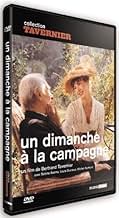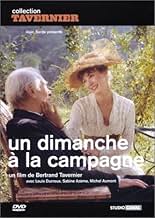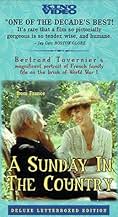IMDb RATING
7.4/10
3.4K
YOUR RATING
An elderly painter whose son visits with his family on the weekends, is also surprised by a visit from his still-single daughter.An elderly painter whose son visits with his family on the weekends, is also surprised by a visit from his still-single daughter.An elderly painter whose son visits with his family on the weekends, is also surprised by a visit from his still-single daughter.
- Director
- Writers
- Stars
- Nominated for 1 BAFTA Award
- 13 wins & 12 nominations total
Sabine Azéma
- Irène
- (as Sabine Azema)
Geneviève Mnich
- Marie-Thérèse
- (as Genevieve Mnich)
- Director
- Writers
- All cast & crew
- Production, box office & more at IMDbPro
Featured reviews
I think this film can be appreciated on several levels. For some viewers, this is just a happy family portrait, reflecting a more peaceful time and recalling one's own memories of family outings and quiet Sunday afternoons. I think this point of view is mistaken, but I can see why people feel this way. The film is externally slow- moving and peaceful, like a sunny river. But like a river, there are strong currents lurking, invisible, under the surface -- currents that cannot be seen, but only observed indirectly from their effects.
There's a lot more going on here than just ninety minutes of bucolic peacefulness. Pay attention to the details, the small looks and gestures, the things said and things left unsaid. You can almost see the fine strands that link the characters, like a spiderweb, where each character's movements are felt by all the others. The role of the narrator, often disparaged in film, is used effectively here, giving the film a somewhat novel-like quality and reminding the viewer of their presence as an observer.
There's more to be said about this film, but I don't feel quite up to it. In any case, the real meaning of the film can't easily be described in words -- which is a good thing, or the film would be unnecessary. So watch the film yourself, if you haven't already, and see what you think.
There's a lot more going on here than just ninety minutes of bucolic peacefulness. Pay attention to the details, the small looks and gestures, the things said and things left unsaid. You can almost see the fine strands that link the characters, like a spiderweb, where each character's movements are felt by all the others. The role of the narrator, often disparaged in film, is used effectively here, giving the film a somewhat novel-like quality and reminding the viewer of their presence as an observer.
There's more to be said about this film, but I don't feel quite up to it. In any case, the real meaning of the film can't easily be described in words -- which is a good thing, or the film would be unnecessary. So watch the film yourself, if you haven't already, and see what you think.
A lot of people consider it Tavernier's best .
An old man lives in the country in a desirable property.He waits for his children's visit .Whereas his son ,Gonzague,who lives a bourgeois life with wife and kids frequently turns up,his daughter Irene , a socialite ,a woman ahead of her time is often too busy in Paris to remember his old papa.
On a clear sunny day,they all gather in the father's house .Suddenly the house does not look that much cozy.The novel on which the movie is based is called "Mr Ladmiral Va Bientôt Mourir" (M.Ladmiral is soon going to die)and Death shows beneath the placid surface : a terrifying vision of the old man on his death bed -there is a similar scene in John Huston's last work-;a fleeting souvenir of a picnic in the garden where they used to eat (wild?) strawberries;more prosaically,when the family arrives near the church,they can hear "Nearer to thee ,my God" (the Titanic band's canticle!).
The admirable sequence in the Guinguettes displays not only Tavernier's tribute to Auguste Renoir,but also his love for the true masters of the French cinema:Auguste's son Jean ("Une Partie de Campagne") ,Julien Duvivier ("La Belle Equipe") and Jacques Becker ("Casque d'or").
This is a brilliant movie by the man who is perhaps the greatest living French director.His command of the picture is so fascinating that even the frequent voice -overs are not redundant.
Like this?Try these.......
Make way for tomorrow Leo McCarey 1937
Une Partie de Campagne Jean Renoir 1936
Wild Strawberries Ingmar Bergman 1957
Eglantine Jean Claude Brialy 1971
The dead John Huston 1987
An old man lives in the country in a desirable property.He waits for his children's visit .Whereas his son ,Gonzague,who lives a bourgeois life with wife and kids frequently turns up,his daughter Irene , a socialite ,a woman ahead of her time is often too busy in Paris to remember his old papa.
On a clear sunny day,they all gather in the father's house .Suddenly the house does not look that much cozy.The novel on which the movie is based is called "Mr Ladmiral Va Bientôt Mourir" (M.Ladmiral is soon going to die)and Death shows beneath the placid surface : a terrifying vision of the old man on his death bed -there is a similar scene in John Huston's last work-;a fleeting souvenir of a picnic in the garden where they used to eat (wild?) strawberries;more prosaically,when the family arrives near the church,they can hear "Nearer to thee ,my God" (the Titanic band's canticle!).
The admirable sequence in the Guinguettes displays not only Tavernier's tribute to Auguste Renoir,but also his love for the true masters of the French cinema:Auguste's son Jean ("Une Partie de Campagne") ,Julien Duvivier ("La Belle Equipe") and Jacques Becker ("Casque d'or").
This is a brilliant movie by the man who is perhaps the greatest living French director.His command of the picture is so fascinating that even the frequent voice -overs are not redundant.
Like this?Try these.......
Make way for tomorrow Leo McCarey 1937
Une Partie de Campagne Jean Renoir 1936
Wild Strawberries Ingmar Bergman 1957
Eglantine Jean Claude Brialy 1971
The dead John Huston 1987
I saw this film many years ago and loved it and just rewatched it again, this time, on DVD with Bertrand Tavernier's commentary. I must say that I love it now even more. The two words that permeate throughout his film rhythm and time. It is strange to me that he does not say that impressionism was a major inspiration in the work, in fact he says the contrary. Yet I've noticed many films where the director meant to do something only it was taken very differently by the viewers and I guess this was such a case.
Anyway to get back to the film, in hearing Tavernier's commentary, I now realize how musical the whole film is, it's lazy, Sunday tone, then Irene (Azema) coming in like a tornado, then quiet conversations, then someone getting stuck in a tree, then another quiet conversation, then a dance...a series of stop starts that lulls you in its rhythm, but awakens you again with bursts of life and vitality.
In speaking of time and the passage of it, Tavernier encapsulates the life of Mr. Lamiral in one Sunday afternoon, and all the bittersweet sadness, through his relationship with his children, grandchildren, maid and himself through his actions and voiceovers made by an all knowing narrator.
I feel a sense of pride that Tavernier points out in his commentary the poignant scenes which I was so touched by in the first viewing. The scene where Irene tells herself that her niece would die young, the scene where Irene and her father speak of painting, The narrator supplying profound insights on M. Ladmiral about his indifference to his grandchildren. Gonzague's and his wife's decency, but utter clumsiness, living a life bounded by convention and security.
I also learned so much about camera movement through Tavernier. He describes not only the how, but why certain shots are shot they are and you begin to understand why certain scenes provoke certain emotions not only through dialogue and setting, but also how you hear something and see something. One scene where Gonzague and his wife are having an argument and M. Ladmiral comes into the scene but rather than say a word to interrupt, he concludes to himself that it is pointless and leaves the scene without uttering a word. Such a scene tells so much, the relationship of the couple, the father's relationship with the couple, and the father's relationship with himself, all in the frame of a 5 second shot. I'm grateful to M. Tavernier for having created such a beautiful film and added such brilliant insight on the nature of this work.
Anyway to get back to the film, in hearing Tavernier's commentary, I now realize how musical the whole film is, it's lazy, Sunday tone, then Irene (Azema) coming in like a tornado, then quiet conversations, then someone getting stuck in a tree, then another quiet conversation, then a dance...a series of stop starts that lulls you in its rhythm, but awakens you again with bursts of life and vitality.
In speaking of time and the passage of it, Tavernier encapsulates the life of Mr. Lamiral in one Sunday afternoon, and all the bittersweet sadness, through his relationship with his children, grandchildren, maid and himself through his actions and voiceovers made by an all knowing narrator.
I feel a sense of pride that Tavernier points out in his commentary the poignant scenes which I was so touched by in the first viewing. The scene where Irene tells herself that her niece would die young, the scene where Irene and her father speak of painting, The narrator supplying profound insights on M. Ladmiral about his indifference to his grandchildren. Gonzague's and his wife's decency, but utter clumsiness, living a life bounded by convention and security.
I also learned so much about camera movement through Tavernier. He describes not only the how, but why certain shots are shot they are and you begin to understand why certain scenes provoke certain emotions not only through dialogue and setting, but also how you hear something and see something. One scene where Gonzague and his wife are having an argument and M. Ladmiral comes into the scene but rather than say a word to interrupt, he concludes to himself that it is pointless and leaves the scene without uttering a word. Such a scene tells so much, the relationship of the couple, the father's relationship with the couple, and the father's relationship with himself, all in the frame of a 5 second shot. I'm grateful to M. Tavernier for having created such a beautiful film and added such brilliant insight on the nature of this work.
I saw this film as a gift. For images, reminding the work of an Auguste Renoir, for portrait of family and the small gestures defining the relations between its members, for lovely acting and for the good state of soul inspired by it.
I discovered it, in same measure, as a beautiful gift offered by Bertrand Tavernier. A precious gift about meaning of life and meanings of visits, about the games of children and problems of adults, about joy and the shadows of sadness, about a venerable manner and the lady helping him in ordinary problems.
Nostalgia ? Off course, but it represents more and , scene by scene, you feel it.
A beautiful film as a precious circle of emotions.
I discovered it, in same measure, as a beautiful gift offered by Bertrand Tavernier. A precious gift about meaning of life and meanings of visits, about the games of children and problems of adults, about joy and the shadows of sadness, about a venerable manner and the lady helping him in ordinary problems.
Nostalgia ? Off course, but it represents more and , scene by scene, you feel it.
A beautiful film as a precious circle of emotions.
In early 20th century France, an impressionist painter is visited at his country estate by his grown children. This is a very low-key film where nothing much happens but where one experiences the satisfaction of having spent a Sunday afternoon in the country engaged in conversation with intelligent people. Ducreux is excellent as the patriarch nearing the end of his life who relishes the visit from his dutiful son and free-spirited daughter, but is overcome with feelings of nostalgia and perhaps regret. The cinematography is gorgeous, with images suggesting impressionist paintings. The soundtrack appropriately consists of chamber music, that of Faure.
Did you know
- TriviaThe film is included on Roger Ebert's "Great Movies" list.
- GoofsIrene's flower in her bodice disappears and then reappears.
- SoundtracksQuintette pour piano et cordes Op. 115
Written by Gabriel Fauré
Performed by Le quatuor Via Nova, Jean Hubeau piano solo
- How long is A Sunday in the Country?Powered by Alexa
Details
- Release date
- Country of origin
- Language
- Also known as
- Ein Sonntag auf dem Lande
- Filming locations
- Château du Grand Saint-Léger, Villers-en Arthies, Val-d'Oise, France(house and garden)
- Production companies
- See more company credits at IMDbPro
Box office
- Gross US & Canada
- $2,411,143
- Gross worldwide
- $2,411,143
Contribute to this page
Suggest an edit or add missing content




























